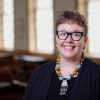This article is more than 5 years old.
[Really, our title should be Bits and Bytes (and Bites!), but y’all know we were in the culinary wonderland that is Charleston, so the bites are a given.]
Chelcie and Molly attended the inaugural Charleston Seminar, a new two-day intensive workshop preceding the Charleston Conference. This year’s topic was Introduction to Data Curation, taught by two guys from UNC: Cal Lee, faculty at the School of Information and Library Science, and Jonathan Crabtree, Associate Director at the Odum Institute. We were two of approximately 30 librarians, faculty, administrators, and vendors from across the U.S. and Canada who attended. Wake Forest was in the middle in terms of institutional research focus represented.
The seminar was a mix of lecture and hands-on activities—Molly used a hex editor for the first time!—and addressed the sociocultural concerns of data curation, as well as the how-to aspects. We were reassured to realize that the paths we have been pursuing are on target for an institution of our size and research context.
Key takeaways:
- keep data lifecycle stages simple; move complexity into functions
- not about data ownership, but data stewardship
- digital curation not the end, but the means to the end of better research
- if we really love this data, need to acknowledge that we (aka, libraries) may not be the best place for it; is it a library conversation, or a campus conversation?
- metadata tells you how to sift through data
- must acknowledge the “Hermeneutic Gap” of archived data: context is often not captured, and is never the same
- ask researchers what terms they would type into Google to find this data; often their terms will be pretty good, and can be used in descriptive metadata
We came back with definite steps to pursue to further the data curation conversations at Wake Forest, but also with the reassurance that libraries’ roles with data need to be ones of advocacy and coordination, not sole responsibility.

2 Comments on ‘Bits and Bytes – DSU in Charleston’
Nice read. Thanks for sharing.
I’m glad the seminar was worthwhile!